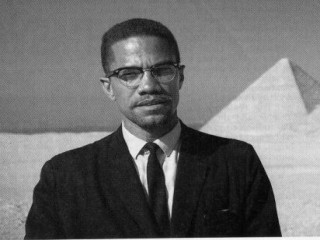
Malcolm X biography
Date of birth : 1925-05-19
Date of death : 1965-02-21
Birthplace : Omaha, Nebraska, U.S.
Nationality : African American
Category : Politics
Last modified : 2011-10-18
Credited as : politician, human rights activist, Black Muslim
Malcolm X, African American civil rights leader, was a major 20th-century spokesman for black nationalism.
Malcolm X was born Malcolm Little on May 19, 1925, in Omaha, Nebr. His father, a Baptist minister, was an outspoken follower of Marcus Garvey, the black nationalist leader in the 1920s who advocated a "back-to-Africa" movement for African Americans. During Malcolm's early years his family moved several times because they were threatened by Ku Klux Klansmen in Omaha; their home was burned in Michigan; and when Malcolm was 6 years old, his father was murdered. For a time his mother and her eight children lived on public welfare. When his mother became mentally ill, Malcolm was sent to a foster home. His mother remained in a mental institution for about 26 years. The children were divided among several families, and Malcolm lived in various state institutions and boarding-houses. He dropped out of school at the age of 15.
Living with his sister in Boston, Malcolm worked as a shoeshine boy, soda jerk, busboy, waiter, and railroad dining car waiter. At this point he began a criminal life that included gambling, selling drugs, burglary, and hustling.
In 1946 Malcolm was sentenced to 10 years for burglary. In prison he began to transform his life. His family visited and wrote to him about the Black Muslim religious movement. (The Black Muslims' official name was the Lost-Found Nation of Islam, and the spiritual leader was Elijah Muhammad, with national headquarters in Chicago.) Malcolm began to study Muhammad's teachings and to practice the religion faithfully. In addition, he enlarged his vocabulary by copying words from the dictionary, beginning with "A" and going through to "Z." He began to assimilate the racial teachings of his new religion; that the white man is evil, doomed by Allah to destruction, and that the best course for black people is to separate themselves from Western, white civilization—culturally, politically, physically, psychologically.
In 1952 Malcolm was released from prison and went to Chicago to meet Elijah Muhammad. Accepted into the movement and given the name of Malcolm X, he became assistant minister of the Detroit Mosque. The following year he returned to Chicago to study personally under Muhammad and shortly thereafter was sent to organize a mosque in Philadelphia. In 1954 he went to lead the mosque in Harlem.
Malcolm X became the most prominent national spokesman for the Black Muslims. He was widely sought as a speaker, and his debating talents against white and black opponents helped spread the movement's message. At this time in the United States there was a major thrust for racial integration; however, Malcolm X and the Black Muslims were calling for racial separation. He believed that the civil rights gains made in America were only tokenism. He castigated those African Americans who used the tactic of nonviolence in order to achieve integration and advocated self-defense in the face of white violence. He urged black people to give up the Christian religion, reject integration, and understand that the high crime rate in black communities was essentially a result of African Americans following the decadent mores of Western, white society. During this period Malcolm X, following Elijah Muhammad, urged black people not to participate in elections because to do so meant to sanction the immoral political system of the United States.
In 1957 Malcolm X met a young student nurse in New York; she shortly became a member of the Black Muslims, and they were married in 1958; they had six daughters.
For at least two years before 1963, some observers felt that there were elements within the Black Muslim movement that wanted to oust Malcolm X. There were rumors that he was building a personal power base to succeed Elijah Muhammad and that he wanted to make the organization political. Others felt that the personal jealousy of some Black Muslim leaders was a factor.
On Dec. 1, 1963, Malcolm X stated that he saw President John F. Kennedy's assassination as a case of "The chickens coming home to roost." Soon afterward Elijah Muhammad suspended him and ordered him not to speak for the movement for 90 days. On March 8, 1964, Malcolm X publicly announced that he was leaving the Nation of Islam and starting two new organizations: the Muslim Mosque, Inc., and the Organization of Afro-American Unity. He remained a believer in the Islamic religion.
During the next months Malcolm X made several trips to Africa and Europe and one to Mecca. Based on these, he wrote that he no longer believed that all white people were evil and that he had found the true meaning of the Islamic religion. He changed his name to El-Hajj Malik El-Shabazz. He announced that he planned to internationalize the black struggle by taking black people's complaints against the United States before the United Nations. For this purpose he sought aid from several African countries through the Organization of Afro-American Unity. At the same time he stated that his organizations were willing to work with other black organizations and with progressive white groups in the United States on voter registration, on black control of community public institutions such as schools and the police, and on other civil and political rights for black people. He began holding meetings in Harlem at which he enunciated the policies and programs of his new organizations. On a Sunday afternoon, Feb. 21, 1965, as he began to address one such meeting, Malcolm X was assassinated.
Since his death Malcolm X's influence on the political and social thinking of African Americans has been enormous, and the literature about him has proliferated. Malcolm X Community College in Chicago, Malcolm X Liberation University in Durham, N.C., and the Malcolm X Society are named for him.
















